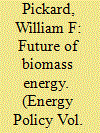|
|
|
Sort Order |
|
|
|
Items / Page
|
|
|
|
|
|
|
| Srl | Item |
| 1 |
ID:
094209


|
|
|
|
|
| Publication |
2010.
|
| Summary/Abstract |
It is pointed out that the apparent decision of the United States to end development of the Yucca Flat, Nevada repository for permanent disposal of radioactive waste may inadvertently place it at variance with the disposal principles of the International Atomic Energy Agency (IAEA) which caution nuclear nations that "The burden on future generations shall be minimized by safely disposing of high level radioactive wastes at an appropriate time, technical, social and economic factors being taken into account." It is then shown that the IAEA's ten technical criteria for underground disposal can seemingly be met by storing vitrified waste a kilometer underground in the crystalline basement rock of a mid-continent shield, where: (a) it should be invulnerable to redistribution by incompetence, natural disaster, or terrorism and (b) there is no obvious pathway for leakage into the biosphere. Finally, a method is proposed by which the storage impasse may be broken.
|
|
|
|
|
|
|
|
|
|
|
|
|
|
|
|
| 2 |
ID:
094837


|
|
|
|
|
| Publication |
2010.
|
| Summary/Abstract |
It is argued: (i) that the harvesting of terrestrial solar radiation to perform useful work is at least an order of magnitude more efficient when carried out by solar-thermal or solar-photovoltaic processes than when carried out by way of biomass conversion and (ii) that, therefore, biomass energy is unlikely to compete successfully with inanimately harvested solar energy-except of course in restricted niche applications.
|
|
|
|
|
|
|
|
|
|
|
|
|
|
|
|
| 3 |
ID:
125515


|
|
|
|
|
| Publication |
2013.
|
| Summary/Abstract |
Renewable energy is abundant, but not necessarily near the urban centers where it will be used. Therefore, it must be transported; and this transport entails a systemic energy penalty. In this paper simple qualitative calculations are introduced to show (i) that high-voltage direct-current (HVDC) power lines for megameter and greater distances are unlikely to achieve power capacities much beyond 2 GW, although they can be paralleled; (ii) that most sources and sinks of electric power are rather less than 10,000 km apart; (iii) that such long lines can be constructed to have transmission lossesView the MathML source2%; and (iv) that lines of such low loss in fact meet minimal standards of intergenerational equity.
|
|
|
|
|
|
|
|
|
|
|
|
|
|
|
|
| 4 |
ID:
113436


|
|
|
|
|
| Publication |
2012.
|
| Summary/Abstract |
The Intermittency Challenge and the approaching need for massive storage of rapidly dispatchable energy has led the concept of the National Battery, a unified facility that holds the aggregated outputs from an array of intrinsically episodic renewable sources, releasing energy as demand requires. In this contribution, the original demonstration of Murphy that lead-acid batteries are inappropriate is first reviewed and then extended to show that no commercially available battery technology is at present appropriate. However, prospectively, underground pumped hydro storage could suffice, and at a lesser cost than suitable batteries.
|
|
|
|
|
|
|
|
|
|
|
|
|
|
|
|
| 5 |
ID:
125695


|
|
|
|
|
| Publication |
2013.
|
| Summary/Abstract |
In a post-carbon energy economy, just as during the Age of Fossil Fuel, the locations where men take control of energy resources (e.g., the coal-pit, the mill wheel, the terminals of a concentrating solar power generator) will often be far removed from the locations where they wish to expend those resources. Therefore, the captured energy resource, once isolated, must somehow be translated from its point of origin to its point of use; and in doing so, its owner must expend energy. In this paper it is argued that, in a sustainably fueled future: (i) renewable energy in its initially transportable form will be overwhelmingly electrical; (ii) energy frugality will dictate long-distance transport of energy as electricity; (iii) intermediate-term (less than a fortnight) storage of energy will be via compressed air energy storage or pumped hydro- or electrochemical batteries, which can not be comparatively evaluated without extensive expensive development and demonstration; and (iv) massive conversion of electrical energy into synthetic fuels will be restricted to selected transportation applications.
|
|
|
|
|
|
|
|
|
|
|
|
|
|
|
|
| 6 |
ID:
115661


|
|
|
|
|
| Publication |
2012.
|
| Summary/Abstract |
Present day electricity is a bargain. It frees mankind from a host of dirty, debilitating occupations-epitomized by the now endangered occupation of legger. Correctly applied, electricity would make a most excellent paramount energy carrier for a post-carbon world. It is, however, only an energy carrier and not a source of energy, the preeminent source for its generation being bargain-priced fossil carbon. But when, in less than a century, that is gone, electricity is a good bet to cost markedly more while being still a bargain. This paper once again shows that mankind's energy needs can be met by (i) renewable solar generation of electricity buffered by (ii) massive electricity storage and (iii) a robust distribution grid. The time available for making this switch from fossil carbon to solar is at best a century and possibly as little as fifty years.
|
|
|
|
|
|
|
|
|
|
|
|
|
|
|
|
|
|
|
|
|